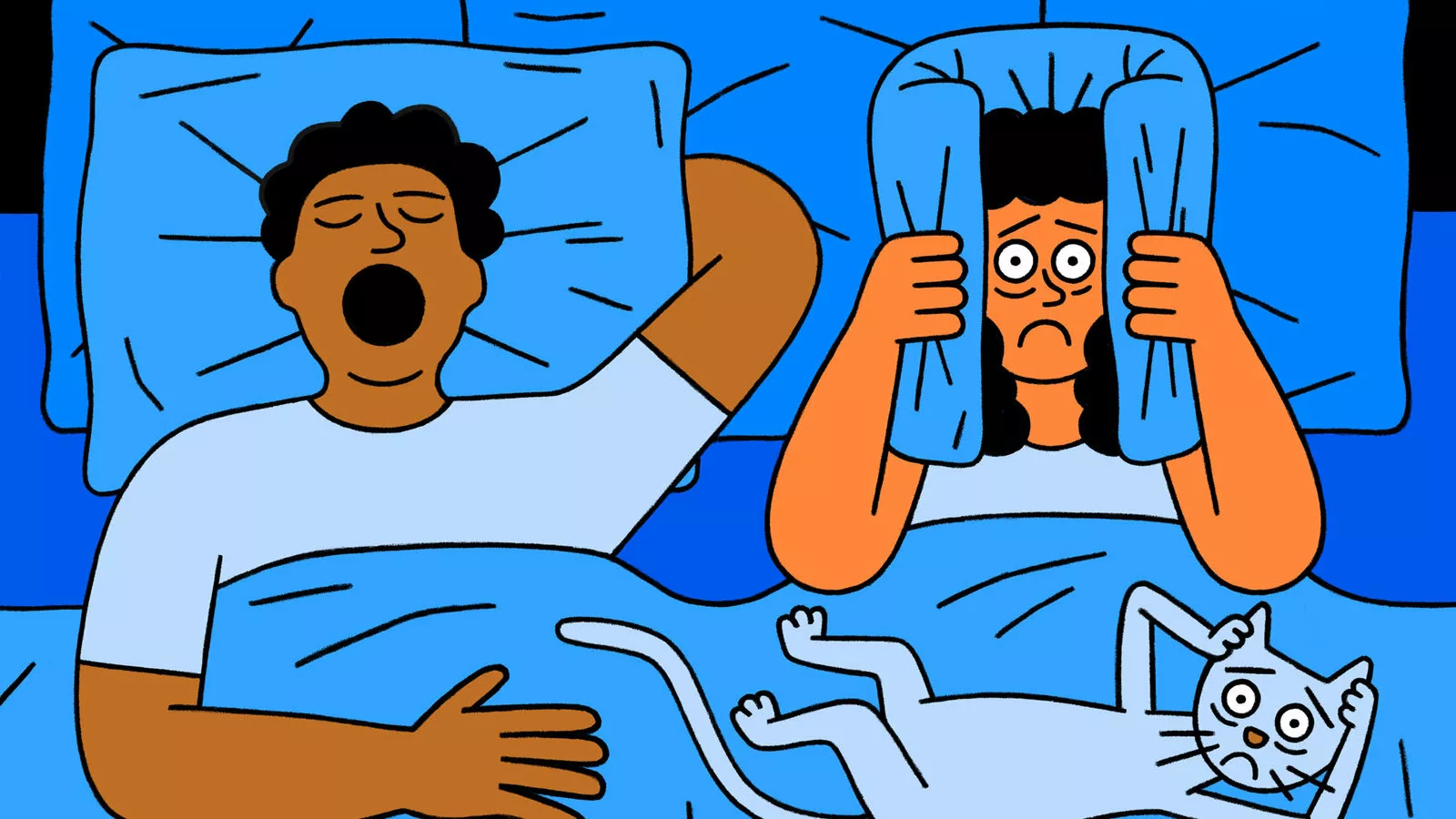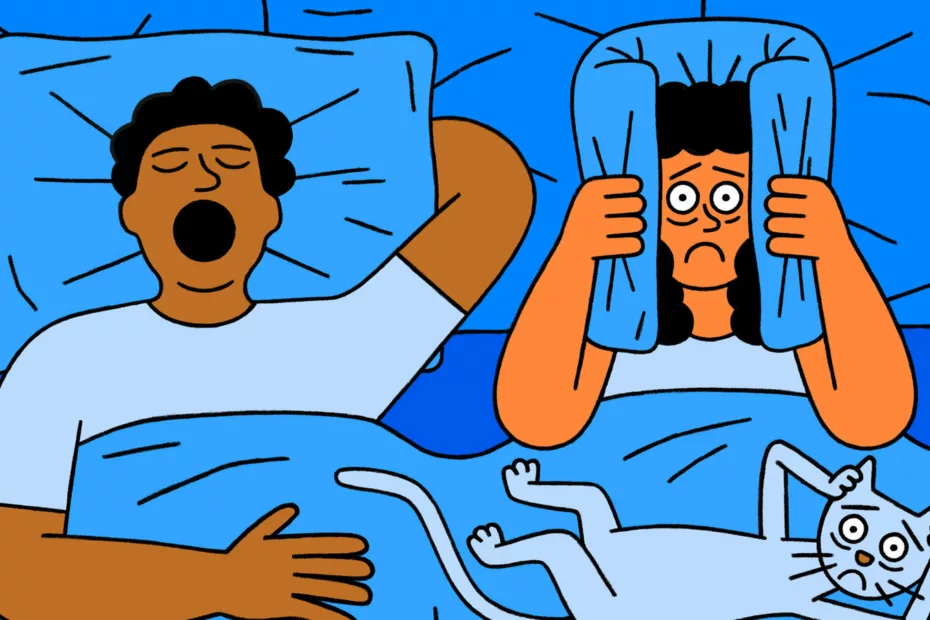Imagine spending a restless night, tossing and turning, while the sounds of rumbling and shaking fill the room like a freight train passing through. This is no ordinary noise; it’s the symphony of snoring that disrupts your sleep. Whether you are the culprit or the unfortunate listener, the phenomenon of snoring is both remarkable and puzzling. In this article, we will uncover the secrets behind the roaring sleep and explore the fascinating world of snoring.

Understanding Snoring
Defining Snoring
Snoring is a common sleep disorder that involves the production of loud, vibratory sounds during sleep. It occurs when the flow of air through the mouth and nose is partially blocked. The obstruction can be caused by various factors, including the relaxation of the throat muscles, anatomical abnormalities, or the presence of excess tissues in the airway. Snoring not only affects the snorer but also their bed partner, making it important to understand its causes and impacts.
Predisposing Factors to Snoring
Several factors can contribute to the development of snoring. Some individuals are more prone to snoring due to their anatomical characteristics, such as a narrow throat or elongated uvula. Age can also be a factor, as the throat muscles tend to relax more with age. Other predisposing factors include obesity, smoking, alcohol consumption, and certain medications, all of which can increase the likelihood of snoring. By identifying these factors, steps can be taken to manage and reduce the occurrence of snoring.
Impacts of Snoring
Snoring can have significant impacts on both the snorer and their bed partner. For the snorer, it often leads to disrupted sleep, resulting in daytime fatigue, difficulty concentrating, and even decreased cognitive function. Snoring can also strain relationships, as the bed partner may experience sleep disturbances, leading to fatigue, frustration, and resentment. Additionally, snoring can impair the quality of sleep for both individuals, affecting their overall well-being and quality of life.
Snoring like a Freight Train: What it means
Deciphering the Metaphor
When someone snores “like a freight train,” it means that their snoring is loud, deep, and resonates throughout the room, much like the sound of a passing train. This metaphor emphasizes the intensity and volume of snoring, which can be disruptive and bothersome to those within earshot. Understanding the metaphor helps paint a vivid picture of the magnitude of snoring and its potential impact on sleep.
Identifying the Features of Freight Train Snoring
freight train snoring is characterized by its intensity and volume. It is often continuous and can be heard from a distance. The sound is deep and resonant, causing vibrations that can be felt in the surrounding environment. Freight train snoring can drown out other sounds in the room and make it difficult for others to sleep peacefully. Identifying these features can help determine the severity of snoring and guide the search for effective solutions.
Causes of Heavy Snoring
Physiological Causes
Physiological factors play a significant role in heavy snoring. The relaxation of throat muscles during sleep can lead to partial blockage of the airway, resulting in turbulent airflow and the distinctive snoring sound. Anatomical abnormalities, such as a deviated septum or enlarged tonsils, can also contribute to snoring. Additionally, overweight or obese individuals may experience snoring due to excess fatty tissues in the throat area that obstruct the airway. Understanding these physiological causes is crucial in developing targeted interventions for heavy snoring.
Environmental Causes
Environmental factors can also contribute to heavy snoring. External influences such as allergens, pollutants, or irritants in the bedroom can trigger nasal congestion or inflammation, making breathing difficult and promoting snoring. Sleeping in a position that restricts the airway, such as on one’s back, can also increase the likelihood of snoring. Environmental causes of snoring can often be addressed by making simple adjustments to the sleep environment and daily routine.
Underlying Health Conditions
In some cases, heavy snoring may be a symptom of underlying health conditions. Sleep apnea, a disorder characterized by pauses in breathing during sleep, often accompanied by loud snoring upon resumption of breathing, is closely associated with snoring. Other health conditions such as nasal congestion, chronic allergies, or hypothyroidism can contribute to snoring as well. Identifying and addressing these underlying health issues is essential in effectively managing snoring and promoting better sleep quality.
Connection Between Snoring and Sleep Quality
Effects on the Snorer
Snoring can significantly impact the snorer’s sleep quality and overall well-being. The loud and disruptive noise caused by snoring often leads to sleep fragmentation, where the snorer experiences brief awakenings throughout the night. These interruptions prevent the snorer from entering deep and restorative sleep stages, resulting in daytime sleepiness, poor concentration, and diminished cognitive performance. Over time, the cumulative effects of poor sleep quality can negatively impact the snorer’s physical and mental health.
Effects on Bed Partners
Snoring not only affects the snorer but also their bed partner. The noise generated by snoring can disrupt the bed partner’s sleep, leading to frustration, fatigue, and a decrease in their own sleep quality. Over time, this can strain the relationship, as both individuals may become increasingly irritable due to sleep deprivation. It is crucial to address snoring not only for the snorer’s sake but also for the well-being and harmony of the entire household.
Understanding Sleep Interruptions Due to Snoring
Sleep interruptions due to snoring can be significant and disruptive. The loud and persistent snoring sounds can awaken the snorer and their bed partner multiple times throughout the night. These brief awakenings may not be consciously remembered, but they disrupt the natural sleep cycle, preventing the snorer from reaching the deeper, more restful stages of sleep. Understanding these sleep interruptions is essential in recognizing the seriousness of snoring and the importance of finding effective solutions.

Link Between Snoring and Serious Health Risks
Snoring and Cardiovascular Ailments
Snoring has been linked to an increased risk of cardiovascular ailments. The repeated nighttime disturbances caused by snoring can lead to higher blood pressure and an irregular heartbeat, both of which can contribute to the development of heart diseases. Snoring can also indicate the presence of obstructive sleep apnea, a condition where breathing pauses during sleep, further exacerbating the cardiovascular risks. Recognizing the connection between snoring and cardiovascular health is crucial in addressing any potential underlying risks.
Snoring and Sleep Apnoea
Snoring can be a symptom of sleep apnea, a potentially serious sleep disorder. Sleep apnea is characterized by pauses in breathing during sleep, which may last for seconds to minutes. These pauses are often followed by loud, gasping snores as the snorer attempts to resume breathing. Sleep apnea not only affects sleep quality but can also increase the risk of cardiovascular problems, stroke, and daytime fatigue. Identifying the presence of sleep apnea is crucial in determining appropriate treatment options.
Cognitive and Emotional Side Effects
Snoring can have cognitive and emotional side effects on both the snorer and their bed partner. Chronic snoring and sleep disturbances can lead to daytime sleepiness, difficulty concentrating, and impaired memory. This can significantly impact the snorer’s quality of life, both personally and professionally. Additionally, the strain caused by disrupted sleep can lead to irritability, mood swings, and decreased emotional well-being for both individuals. Recognizing these cognitive and emotional side effects is essential in finding comprehensive solutions for snoring.
Diagnosing Excessive Snoring
Self Diagnosis and Assessment
While self-diagnosis is not a substitute for medical consultation, it can provide valuable insights into the severity and potential causes of snoring. Keeping a sleep diary can help track snoring patterns and identify potential triggers or underlying factors. Assessing lifestyle habits, such as alcohol consumption, smoking, and sleeping position, can also offer clues to the causes of snoring. However, it is important to consult a healthcare professional for an accurate diagnosis and appropriate treatment recommendations.
Medical Diagnosis: Tests and Procedures
To diagnose excessive snoring and determine underlying causes, healthcare professionals may recommend a series of tests and procedures. These can include physical examinations, evaluation of medical history, and sleep questionnaires. To assess the severity of snoring and potential sleep apnea, a sleep study may be conducted. This involves monitoring various physiological factors during sleep, such as breathing patterns, heart rate, and oxygen levels. Seeking medical diagnosis is crucial in understanding the specific factors contributing to snoring and tailoring appropriate interventions.
Sleep Study and Analysis
A sleep study, also known as polysomnography, is a comprehensive assessment of an individual’s sleep patterns and physiological responses during sleep. It involves spending a night in a sleep laboratory while being monitored by various sensors and equipment. These sensors measure brain waves, eye movements, muscle activity, heart rate, and more. This detailed analysis helps identify the presence and severity of sleep disorders, including sleep apnea, and provides valuable data for effective treatment planning.

Lifestyle Adjustments to Manage Snoring
Weight Management
Weight management plays a crucial role in reducing snoring. Excess weight, especially around the neck and throat area, can contribute to the obstruction of the airway, leading to snoring. Incorporating a balanced diet and regular exercise into one’s lifestyle can aid in weight loss and improve overall health. Shedding excess pounds not only reduces snoring but also decreases the risk of developing various health conditions associated with obesity.
Adjusting Sleeping Positions
Modifying sleeping positions can significantly alleviate snoring. Sleeping on one’s back tends to cause the base of the tongue and soft palate to collapse, obstructing the airway. Encouraging side sleeping or elevating the head using pillows can help keep the airway open and reduce snoring. Experimenting with different sleep positions can help identify the most effective position for minimizing snoring and improving sleep quality.
Reducing Alcohol Consumption and Smoking
Alcohol consumption and smoking are known to worsen snoring. Alcohol relaxes the throat muscles, increasing the likelihood of airway obstruction and snoring. Smoking irritates the airways, causing inflammation and congestion that can contribute to snoring. By reducing or eliminating alcohol consumption and quitting smoking, individuals can significantly improve their sleep quality and reduce snoring.
Medical Interventions for Heavy Snoring
Medications and Nasal Sprays
In some cases, medications and nasal sprays may be prescribed to manage heavy snoring. These interventions aim to reduce nasal congestion or inflammation, promoting clear airflow and reducing snoring. Medications may include nasal steroids, antihistamines, or decongestants. Nasal sprays, such as saline sprays or nasal dilators, can also help open the nasal passages. It is important to consult a healthcare professional before using any medications or nasal sprays to ensure their suitability and effectiveness.
Therapeutic Devices: CPAP and Oral Appliances
Continuous Positive Airway Pressure (CPAP) devices and oral appliances are commonly used to treat heavy snoring and sleep apnea. CPAP therapy involves wearing a mask over the nose or mouth that provides a continuous stream of air, keeping the airway open during sleep. Oral appliances, such as mandibular advancement devices, help reposition the jaw and tongue to prevent airway obstruction. These therapeutic devices can effectively manage snoring and improve sleep quality, but their usage should be guided by a healthcare professional.
Surgical Options for Snoring Relief
In certain cases, surgical interventions may be considered for snoring relief. Surgical procedures aim to address anatomical abnormalities or correct structural issues that contribute to snoring. These procedures may involve removing excess tissues from the throat, correcting a deviated septum, or repositioning the palate or uvula. Surgical options are typically recommended after other interventions have been unsuccessful or when the snoring is severe and adversely impacting quality of life. It is important to thoroughly discuss the potential risks and benefits with a healthcare professional before considering surgical options.

Alternative Treatment Approaches
Benefits of Natural Remedies
Natural remedies can complement traditional treatments for snoring. They often involve lifestyle modifications and the use of herbal remedies to improve sleep quality and reduce snoring. Natural remedies may include steam inhalation to alleviate congestion, the use of essential oils to promote relaxation, or herbal teas to soothe the throat. While natural remedies may offer symptomatic relief, their effectiveness varies, and it is crucial to consult a healthcare professional before use, especially when combined with other treatment approaches.
Yoga and Breathing Exercises
Yoga and breathing exercises can be effective in managing snoring. Certain yoga postures and exercises promote relaxation, improve muscle tone, and enhance respiratory function. Practices such as pranayama, the controlled breathing technique, can help strengthen the respiratory muscles and improve airflow during sleep. Regular practice of yoga and breathing exercises can contribute to better sleep quality and reduce the frequency and intensity of snoring.
Holistic Approaches to Snoring
Holistic approaches to snoring involve addressing the underlying physical, psychological, and environmental factors that contribute to snoring. This includes techniques such as acupuncture, hypnotherapy, and chiropractic adjustments, which aim to rebalance the body and promote overall well-being. These holistic approaches focus on improving sleep quality, reducing stress, and achieving a state of harmony within the body. It is important to consult experienced practitioners in these fields to determine the suitability and effectiveness of these treatments.
Navigating Relationships with a Heavy Snorer
Understanding Your Partner’s Struggles
Living with a heavy snorer can be challenging, but understanding your partner’s struggles is crucial. Snoring is often beyond their control and can lead to sleep disturbances, fatigue, and health issues. By recognizing the impact of snoring on their well-being, you can approach the situation with empathy and patience. Open communication and mutual support are essential in navigating this challenge together.
Creating a Sleep Friendly Environment
Creating a sleep-friendly environment can greatly alleviate the impact of snoring on bed partners. Using earplugs or white noise machines can help drown out snoring sounds. Ensuring a comfortable mattress, pillows, and bedding can promote better sleep quality despite the noise. Additionally, maintaining a cool, dark, and well-ventilated bedroom can facilitate restful sleep for both individuals.
Coping Strategies for Bed Partners
Individuals sharing a bed with a heavy snorer can benefit from coping strategies to manage the sleep disturbances. Establishing consistent sleep routines and practicing relaxation techniques before bedtime can help diminish the impact of snoring on their own sleep. Seeking social support, engaging in stress-reducing activities, or considering separate sleeping arrangements if necessary can also contribute to improved well-being. It is important to prioritize self-care when dealing with the challenges of living with a heavy snorer.
In conclusion, snoring can significantly impact sleep quality and overall well-being for both the snorer and their bed partner. Understanding the causes, impacts, and potential health risks of snoring is crucial in developing effective interventions. From lifestyle adjustments to medical treatments and alternative approaches, there are various strategies available to manage snoring and improve sleep quality. By approaching the issue with empathy and open communication, individuals can navigate the challenges of living with a heavy snorer and create a sleep-friendly environment for better rest and enhanced relationships.







